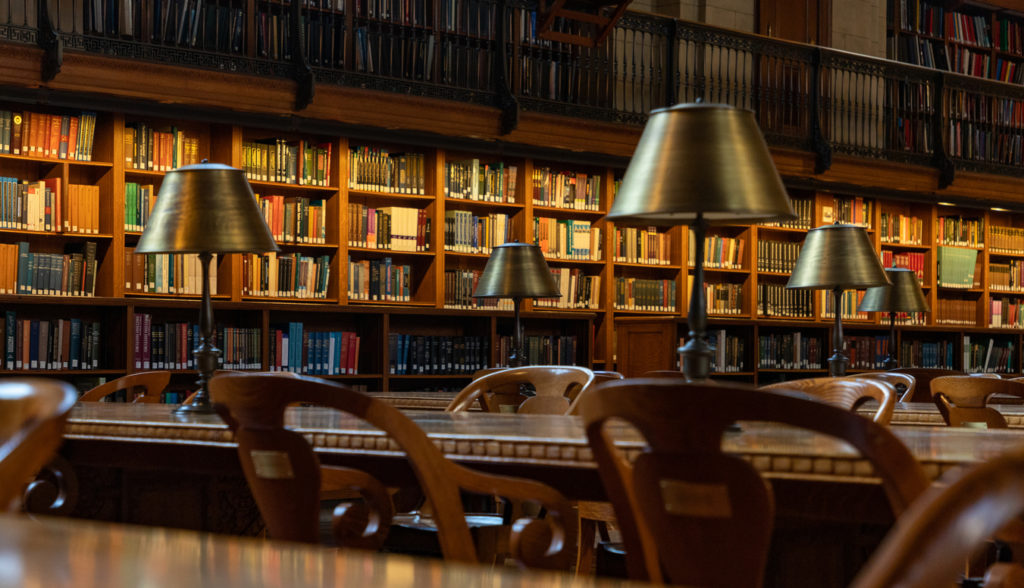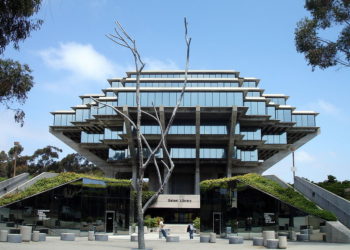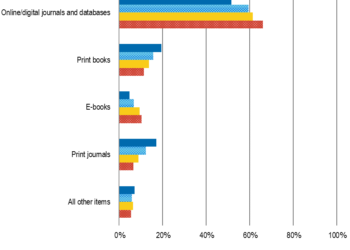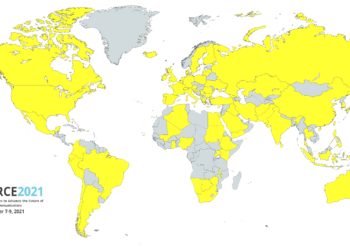One of the constants in scholarly communication is the importance of understanding the full system of knowledge production. Whether you are a researcher, work in a library or in publishing, or in one of the myriad places deploying the myriad skills needed to create and share knowledge, it’s always helpful to spend time reflecting on how your own position and work relates to others.
Another constant is that many of us are big readers. And if you really, really love reading, whatever your professional situation in this business, you might also really love reading about reading – and libraries. And librarians. I’ve been reading a lot about libraries for a long time, and more lately. But the category is huge, and it feels like a good time in a globally hard year to think about the pleasures of reading about something that is a near-universal good (excellent critiques of the form and practices of collecting and more notwithstanding). A warning that this post is a bit like those tweets that ask for references; help me crowdsource, with this global crowd of scholarly comms folks, a bigger list of great books about libraries and librarians.

Books about libraries range from academic analyses of the social and economic origins of library foundations (like the Carnegie Libraries, which are located predominantly in the U.S. but also in the U.K., Australia, and elsewhere) to accounts of librarians saving books from the violence of war, to the sheer visual pleasure of library architecture and interiors. Book Riot just ran a feature on historical libraries in my new hometown of Providence, Rhode Island and perhaps I’m only a touch biased, but wow have we got some beauties (I’m partial to #5, and am headed for a visit to #6 tomorrow). The history of libraries and librarians is an academic field of inquiry, a hobbyist’s pleasure, and for many of us should be a professional necessity.
One of the first books people started to recommend to me earlier this year, but which I didn’t read until one of my board members suggested it again, is The Personal Librarian by Marie Benedict and Victoria Christopher Murray. A novel about the great book woman and the founding director and librarian of the Pierpont Morgan Library (now the Morgan Library and Museum) in New York City, Belle da Costa Greene, Benedict and Murray’s book explores Greene’s life as a Black woman living and professionally triumphing as a white woman in the early twentieth century in a story about racism, collecting, and the birth of one of the world’s great libraries. It’s a great read, but it also made me hungry to learn more about Greene and about the world of women librarians in her era. I just started a 2007 biography of Greene. The Morgan is planning an exhibit on Greene in 2024, and has been sponsoring some research on Greene’s work and life including transcription and digitization and a digital platform with I Tatti for some of her correspondence.
Over on Five Books Richard Ovenden, the 25th librarian of Oxford University’s Bodleian Library, talked about his role and the historic institution he leads. He also recommended five books about libraries; it’s worth checking out his selection. Among them I concur about the thrill and terror of Susan Orlean’s The Library Book about the fire at the Los Angeles Public Library in 1986. It’s a visceral book, bringing you close to the nearly-indescribable heat of the fire itself and into the soggy post-fire mess of thousands upon thousands of volumes, along with the staffing and infrastructure that created the Library and then had to be rebuilt. I’ve thought lately that though I just bought Ovenden’s own lauded work, Burning the Books: A History of the Deliberate Destruction of Knowledge, a year ago, it is worth a serious re-read in light of the efforts to ban the 1619 Project and associated (or even vaguely related) work.
I’d like to read more about librarians and their innovative practices. I read the novel The Paris Library, but am waiting to find a good history of the place and its people. As a historian running a library, I am perhaps naturally attracted to histories of these great institutions and the people who have built them; I’ve certainly been scouring the institutional archives and histories of the John Carter Brown Library, and using the collections at Brown University’s Hay Library to learn more about some of the early librarians. But I’d still like more context. I’m wondering, for example, why I can’t find a good book about Henriette Davidson Avram, the computer scientist who developed the MARC format at the Library of Congress. I’m also going to pick up over the break Peter Devereaux’s The Card Catalog: Books, Cards and Literary Treasures. In a blog interview for the LOC, he described the innovation of card cataloging so elegantly, and also reminded that one impetus for a virtual catalogue came from the sheer weight of the thing. “By the 1950s, as the main card catalog at the Library surged to more than 9 million cards in 10,500 trays, staff grew increasingly concerned.”
Libraries and librarians the world over are complex, diverse, and distinctive — and in addition to filling vital roles for people and societies who depend on their critical function of providing information and preserving knowledge, they make for fascinating reading. I’m based in the U.S., and have read a lot about U.S. libraries. But having read a couple of academic articles about libraries in India, I’d like to read a general audience book about both private libraries and public library systems there. Having watched with horror as the news reported the loss to fire of special collections at the University of Cape Town earlier this year, I’d like to know about this particular library but also other university libraries in Africa. The universe of stories and histories of libraries and librarians is vast. Share some of your favorites in the comments?
Discussion
47 Thoughts on "Reading About Libraries and Librarians"
Another one you might want to add to your reading list is a book issued at the beginning of November: The Library: A Fragile History by Andrew Pettegree and Arthur der Weduwen, published by Basic Books.
I looked at that! Will add to my list. I think I’ll do a short follow up post after the winter break if I get enough suggestions here. Thank you!
I took a History of Libraries course while in library school and enjoyed reading Jodi Kanter’s “Presidential Libraries as Performance: Curating American Character from Herbert Hoover to George W. Bush” (pub. 2016). My final paper for the class examined the debate surrounding the funding of these institutions, their often idealized representation of presidential history (hagiography), and the move from the traditional archive-museum to an all-digital model (like Obama’s). I’ve only visited the JFK Presidential Library, but the subject really piqued my interest, so I plan to visit the FDR Presidential Library – hopefully next year!
I know you are looking beyond the US, but I really like Wiegand’s focus on the library in people’s lives, rather than the more common focus of people in the library, in his 2017 book “Part of Our Lives.” (http://www.worldcat.org/oclc/989038860). On book destruction (which often involves library destruction as well) I recommend Fernando Baez’s 2004 “A Universal History of the Destruction of Books.” (http://www.worldcat.org/oclc/651077394). S. R. Ranganathan’s 1931 “Five Laws of Library Science” (http://www.worldcat.org/oclc/251233754) remains a classic touchstone for me, and while it is famous for its five laws, includes much practical information about 20th century libraries in India. Finally, Battle’s “Library: an unquiet history.” (http://www.worldcat.org/oclc/987769705).
That’s a great point about the library in our lives; I suspect all of us reading and commenting have been deeply influenced by our experiences of libraries both as individuals and also as part of various kinds of community. Those are all great suggestions, thank you!
Oooh, I also read Battles’ book. Fascinating! I especially liked the chapter about “knowledge on fire,” particularly the story of how the Jewish people, led by Herman Kruk, built a library in the Vilna ghetto during the Holocaust. Such dedication to the preservation and circulation of knowledge!
You might also check out Mark Purcell’s ” The Country House Library”, Yale U.P. 2017. An excellent and thoroughly well written and illustrated book. Very enjoyable.
Thanks Karin! I share your appreciation for Susan Orlean’s book. Here’s a couple of enjoyable reads that are just slightly outside the scope of ‘librarians and libraries’: Ross King’s “Bookseller of Florence” and Edward Wilson-Lee’s “The Catalogue of Shipwrecked Books”.
Karin, you might find this of interest given your other interests ….
W M Jacob, ‘Parochial Libraries and Their Users’, in Library & Information History (Dec 2011); its in fact part of a special issue on parochial libraries in Britain
If you are interested in libraries and librarians in fiction, watch for this book which will be coming very soon from Mythopoeic Press: Loremasters and Librarians in Science Fiction and Fantasy: A Gedenkschrift for David Oberhelman, edited by Jason Fisher and Janet Brennan Croft (full disclosure — that’s me!)
Ooh! Fiction about libraries — here’s a good recent one: The Starless Sea by Erin Morgenstern https://erinmorgenstern.com/the-starless-sea/
This looks fantastic! Thank you so much for mentioning it, and congratulations on publication!
It’s been announced on Facebook — cover and table of contents: https://www.facebook.com/MythPress/photos/pcb.4545223188932316/4545214735599828/
I was about to recommend Fernando Baez’s 2004 “A Universal History of the Destruction of Books” when I realized that Jonathan Miler already had done so. It is an important work for its breadth of coverage and also reminds us of how fragile libraries become in times of war and destruction. So much knowledge has already been lost!
I don’t think I see this listed yet: Palaces for the People: How Social Infrastructure Can Help Fight Inequality, Polarization, and the Decline of Civic Life (2019) by Eric Klinenberg
Surely no list is complete without Jose Luis Borges’s “The Library of Babel”: https://sites.evergreen.edu/politicalshakespeares/wp-content/uploads/sites/226/2015/12/Borges-The-Library-of-Babel.pdf
Consider the importance of libraries in prisons. I read Running the Books: The Adventures of an Accidental Prison Librarian By Avi Steinberg. There’s also Reading behind Bars: A True Story of Literature, Law, and Life as a Prison Librarian by Jill Grunenwald.
While not about libraries per se, I recommend Dear Books to Prisoners: Letters from the Incarcerated (https://www.bookstoprisoners.net/merchandise/). It’s a beautifully designed collection of letters from prisoners about how much they have valued the books sent to the by Books to Prisoners (a terrific nonprofit whose mission is what it’s name suggests).
A memoir by an incarcerated man (later exonerated) about the book group he started on death row:
The Sun Does Shine: How I Found Life and Freedom on Death Row by Anthony Ray Hinton & Lara Love Hardin
I haven’t read either of these, but I read excerpts of Wiegan’s in Library Journal:
Irrepressible Reformer: A Biography of Melvil Dewey
by Wayne A. Wiegand (1996)
The Efficient, Inventive (Often Annoying) Melvil Dewey
by Alexis O’Neill and Edwin Fotheringham (2020)
(promising title!)
Thanks so much, such an important perspective. Looking forward to following up and I hope many others will, too.
Great comment, Mary, and I’m so glad to hear about the non-profit Books to Prisoners. As an academic myself, I periodically need to cull my library to make room for new materials and I had no idea what to do with the surplus except give them to “friends of the library” book sales–which went on hiatus during the pandemic. I’d much rather donate them to prisoners!
For a change of pace between the true story books you might also like a fictional one about a library: The Strange Library by Haruki Murakami.
Thanks so much to everyone who commented and suggested reading. I’m going to create a fuller list, will share it and see if we can add even more to it in the new year.
What a wonderful list! I’ll be looking into it!
While I was writing “The Weight of Ink”, I thought of it in part as a love letter to historians, librarians and document conservators.
Rachel, _The Weight of Ink_ is one of my all-time favorite novels. It is exactly that kind of love letter, and compelling and meaningful and moving and motivating all at once. I wrote about it in my picks for best books in our 2017 round-up!! https://scholarlykitchen.sspnet.org/2017/11/21/chefs-selections-best-books-read-2017-part-1/
Karin, thank you! I’m so honored to have the novel included in that 2017 roundup! And “Never Caught” sounds like absolutely essential reading. I’ll make sure to pick up a copy. Thank you again for the kind words, and best wishes!
It made my day to see you comment here, Rachel! And I know you will love _Never Caught_ and appreciate the work Erica Dunbar does with those archival fragments.
Wishing you a wonderful new year! And also wanted to chime in again to recommend Anthony Doerr’s Cloud Cuckoo Land. I’m halfway through, listening on audiobook while I cook and walk the dog, and I can say it’s the best novel I’ve read in ages. It’s also a beautiful tribute to libraries and what they can mean to people.
Just a quick little story. I have 4 children, all grown. Their 1st trip/walk out was to the library. I am now 89 yrs. old(yikes) and your website was forwarded to me by my youngest son, who is a dean of the library at the University of Florida.
I volunteered at libraries in many places where we lived. God Bless ALL you wonderful librarians for the grand things you do and the joy you bring to so many lives.
You must read the story of Sandra “Sunny” Marlow, the librarian who discovered evidence of Cold War-era radiation experiments conducted on residents of the Walter E. Fernald State School. Her story is so unbelievable, so improbable, that I had no choice but to write about it: https://reflectionsnarrativesofprofessionalhelping.org/index.php/Reflections/article/view/1418.
I’d love any feedback you’d be willing to share.
Remote Access: Small Public Libraries in Arkansas was recently published by the University of Arkansas Press.
With their cameras and notebooks in hand, photographers Sabine Schmidt and Don House embarked on an ambitious project to document the libraries committed to serving Arkansas’s smallest communities. Remote Access is the culmination of this fascinating three-year effort, which took the artists to every region of their home state.
Schmidt’s carefully constructed color images of libraries and the communities they serve and House’s rich black-and-white portraits of library patrons and staff shine alongside the authors’ personal essays about their experiences. The pages here come alive with a deep connection to Arkansas’s history and culture as we accompany the authors on visits to a section of the Trail of Tears near Parkin, to the site of the tragic 1959 fire at the Arkansas Negro Boys Industrial School in Wrightsville, and to Maya Angelou’s childhood home in Stamps, among many other significant destinations.
Through this testament to the essential role of libraries in the twenty-first century, Schmidt and House have created a clear-eyed portrait of contemporary rural life, delving into issues of race, politics, gender, and isolation as they document the remarkable hard work and generosity put forth in community efforts to sustain local libraries.
A short read is Down Cut Shin Creek: The Pack Horse Librarians of Kentucky by Kathi Appelt and Jeanne Schmitzer (Purple House Press, 2019) about the depression.
For local (Providence) flavor: Margaret B. Stillwell, Librarians are Human: Memories in and out of the Rare-Book World, 1907-1970 (Boston: Colonial Society of Massachusetts, 1973) is a delight.


